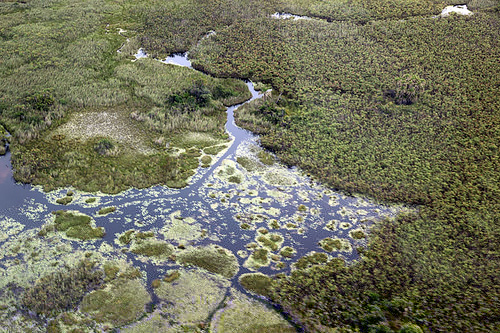This is the third post in a series that follows Alexandra Cousteau’s Blue Planet Expedition, a 100 day journey to 5 continents to study the interconnectivity of water.

The next part of Cousteau’s Blue Planet expedition takes her to her to the Okvango Delta in Botswana. Often called the ‘Cradle of Life’ for it’s role in the origin of the human species, the Okavango is the largest inland delta on Earth. Renowned for its diverse wildlife, which includes zebras, antelope, elephants, and Cape buffalo. It is a unique ecosystem, drawing water from thousands of miles away to a miracle oasis in a country that is largely a desert.
While the Okavango Delta is managed as a national park and tourist destination, competing interests have other plans. They propose to siphon off water from the Delta for agriculture irrigation of one million hectares, to provide drinking water to the city of Maun, and to increase supplies to the Orapa diamond mine.
But today the river water is pure. So pure that you can drink from it as you sail down its hippo paths in a mokoro (narrow canoe). According to Cousteau’s blog,
“Here is one of the last places where the water runs pure and an incredible diversity of wildlife roam free and unhunted, as both did before humankind began fundamentally altering the landscape.”
Map Ives, a naturalist and explorer from Botswana, maintains that as long as you do not tamper with natural waterways by building damns or redirect riverflow, then you can protect the world’s pure water. The water in the Okawango Delta is testimony to this. It is a tremendous natural filtration system, the baseline for clean river delta systems around the world.
Ives explains how termites are integral to the river’s topography and how the river sustains each plant and animal that lives in these areas. In watching the video of Cousteau’s trip to Botswana, it becomes clear that the world has a desperate need to protect biodiversity if we want our natural waterways to be protected and preserved. And vice versa. Both go hand-in-hand, and both are integral to protecting our planet.
Cousteau tells us that even though water is very scarce in Africa, even though it has become a source of conflict, Angola and Botswana have come together to cooperate and collaborate to protect the source of water.
Watch this video of Cousteau’s trip to the Okavango Delta. For more information, visit www.alexandracousteau.com.
httpv://www.youtube.com/watch?v=keGWM2COGyU

You must be logged in to post a comment.